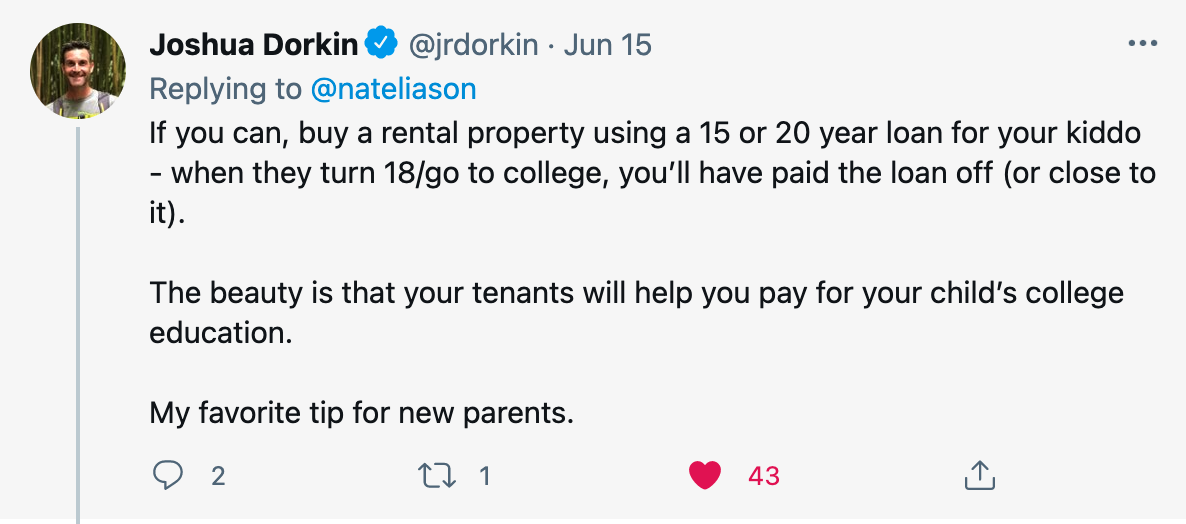Medley 267: Stablecoins, Quitting, Financials, Grit, Iron, Hard Things, Projects...
Happy Monday!
Last week I published another edition of DeFriday focused on how the Iron Protocol lost $2b in one day, and what that means for the DeFi and stablecoin ecosystem at large.
And that's it! Let's move on to the Medley.
The World of Finance
I asked Twitter last week what are some clever ways to help set your kid up financially, besides contributing to a college fund.
There were some great replies. First, here's my thinking around not doing a college fund:
"I'd rather create a pool of money she can draw on for whatever kind of ongoing education she wants to pursue when she's 18. College, a startup, culinary school, real estate, don't want to lock into one education medium."
One of the hosts of BiggerPockets had a great idea around buying a rental property:

I also like this idea around opening a brokerage account for them, my Dad did something similar for me when I was pretty young:

What are some other clever ideas? Not to set them up for life, but to help them learn about money and give them a strong starting point when they turn 18.
The World of Projects & Quitting
Related to the Steve Jobs stories from last week, Paul Graham published a great essay on finding "A Project of One's Own."
I've been finding that there's a huge difference in parenting perspectives from adults who make money working on something they love doing, vs. parents who make money doing "a job" and see work as more of a means to an end.
The former parents are more in favor of letting kids explore whatever they want to find the projects they resonate with. The latter parents think it's more important to get good grades, learn an instrument, and follow the more traditional path.
If you see money as something that comes from doing well at things you don't want to do, then you'll naturally want to train your kid to do well at things they don't want to do. But if you see money as coming from doing well at things you want to do, then you'll encourage your kid to find the things they want to do that can also create value for others.
I love this line from the essay:
"It's a bit sad to think of all the high school kids turning their backs on building treehouses and sitting in class dutifully learning about Darwin or Newton to pass some exam, when the work that made Darwin and Newton famous was actually closer in spirit to building treehouses than studying for exams."
And later on:
"Kids just plunge in and build their treehouse without worrying about whether they're wasting their time, or how it compares to other treehouses. And frankly we could learn a lot from kids here. The high standards most grownups have for "real" work do not always serve us well."
I absolutely love my work. I'll often be outside at my desk by 7-7:30 because I'm looking forward to starting on programming or writing something. That's a rare privilege most people don't get to have, and I think it takes years and years of experimentation and trying things out.
Most projects will fail. Or be given up on. And having an unhealthy commitment to projects you started prevents you from finding the ones that really resonate. I've quit 99% of the things I've started working on, and I'm really glad I did. I'm terrible at following through on most things I start, but how many people can say they've published a newsletter every single Monday for 5 years in a row?
Quitting is how you commit to things. If I didn't quit almost everything, I'd probably be some miserable management consultant somewhere.
It's hard to think of a good framework for quitting, but Angela Duckworth's "hard thing" rules aren't bad:
- You have to work on a "hard thing" that requires deliberate practice
- You can quit, but you can't quit until a natural stopping point
- You get to pick your hard thing
The one way I'd modify them is: You can quit early if there's another hard thing you're excited to work on. Quitting learning Spanish to watch TV isn't a good reason. But quitting learning Spanish because you're obsessed with learning programming is a great idea. Nothing is gained by forcing yourself to sit through the rest of a semester of classes you don't like, you're just throwing good time after bad.
We just have to avoid getting stuck in the sunk cost mindset. 10 years of Spanish lessons doesn't justify 10 more of them. Quitting is how we commit to things.
Anyway, that turned into more of an essay than I intended, so I'll wrap the Medley here.
Have a great week!